| Srl | Item |
| 1 |
ID:
085436
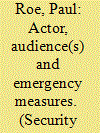

|
|
|
|
|
| Publication |
2008.
|
| Summary/Abstract |
The concept of securitization has produced a considerable amount of debate over the meaning of security. However, far less attention has been paid to the role of audiences and their relationship to actors in the securitization process. Informed by the work of Thierry Balzacq (2005), and through analysis of the decision of the UK government to join with the USA in the 2003 invasion of Iraq, in this article I show that although the general public can indeed play a valuable role in providing an actor with `moral' support concerning the `securityness' of an issue, more crucial, however, is the `formal' support provided by parliament concerning the `extraordinaryness' of the means necessary to deal with it. My argument is thus that securitization can in this way be seen as a distinct two-stage process marked by a `stage of identification' and a `stage of mobilization'
|
|
|
|
|
|
|
|
|
|
|
|
|
|
|
|
| 2 |
ID:
129846
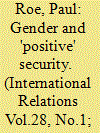

|
|
|
|
|
| Publication |
2014.
|
| Summary/Abstract |
Focusing predominantly on the works of Ken Booth and Bill McSweeney, this article explores how the normative commitment of the two writers to the individual referent and to a set of values constitutive of human agency is reflective of a more 'positive' security. In particular, the article focuses on how in their formulation of values, both Booth (security as emancipation) and McSweeney (ontological security) draw on gender and feminist approaches and, importantly, how critical feminist scholarship can profitably be used to reconcile concentration on both the global and the local, thus providing greater conceptual clarity and empirical grounding to the positive security project.
|
|
|
|
|
|
|
|
|
|
|
|
|
|
|
|
| 3 |
ID:
113726
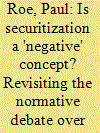

|
|
|
|
|
| Publication |
2012.
|
| Summary/Abstract |
The purpose of this article is to revisit the normatively defined debate over securitization as a negative conception. Claudia Aradau's work has largely served to define this debate, with Aradau arguing that securitization/security is an inherently negative conception inasmuch as its mode of extraordinary politics necessarily both institutionalizes fast-track decisionmaking ('process') and produces categories of enemy others ('outcome'). In making evident the main assumptions therein, my argument is that this debate has taken place not only in terms of a specific - and indeed contestable - rendering of the securitization concept, but also in terms of a more general acceptance of an essentialized (Schmittian) logic of security. The article thus seeks ultimately to demonstrate the value of de-essentializing the practices evoked by speaking security and to show how this enables meaningful engagement with other emerging conceptions of 'positive' security.
|
|
|
|
|
|
|
|
|
|
|
|
|
|
|
|
| 4 |
ID:
054663
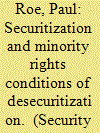

|
|
|
| 5 |
ID:
088352
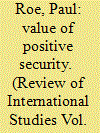

|
|
|
|
|
| Publication |
2008.
|
| Summary/Abstract |
This article seeks to revise the concept of Positive Security. Although largely neglected by the existing Security Studies literature, Bill McSweeney's work otherwise represents a significant contribution in this regard. The author argues, however, that although of great value, McSweeney's positive security formulation is unduly restrictive in terms of the referent object and to the sectors of security it is applicable to, and cannot unproblematically be equated to ontological security, as McSweeney's work tends to do. Employing Graham Smith's notion of a 'generic' security conception, and placing positive security more firmly in the peace studies tradition, the author suggests rather that a revised concept be predicated on the defence of 'just' values.
|
|
|
|
|
|
|
|
|
|
|
|
|
|
|
|
| 6 |
ID:
062082
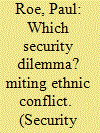

|
|
|